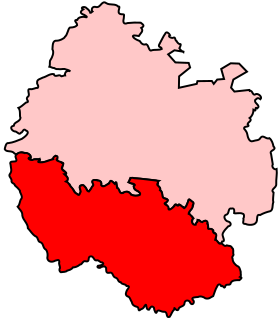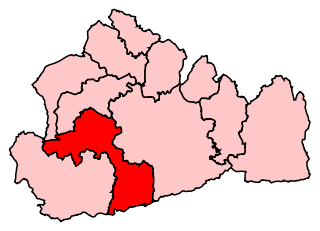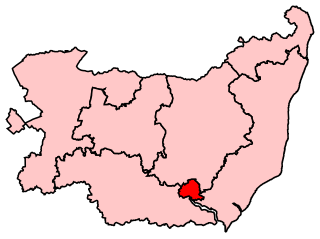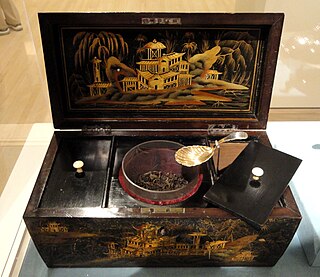Related Research Articles

Hereford was, until 2010, a constituency of the House of Commons of the Parliament of the United Kingdom. Since 1918, it had elected one Member of Parliament (MP) by the first-past-the-post voting system.

Francis Egerton, 1st Earl of Ellesmere,, known as Lord Francis Leveson-Gower until 1833, was a British politician, writer, traveller and patron of the arts. Ellesmere Island, a major island in Nunavut, the Canadian Arctic, was named after him.

East Surrey is a constituency represented in the House of Commons of the UK Parliament since 2019 by Claire Coutinho, a Conservative. The seat covers an affluent area in the English county of Surrey.

Guildford is a constituency in Surrey represented in the House of Commons of the UK Parliament since 2019 by Angela Richardson, a Conservative.

Ipswich is a constituency represented in the House of Commons of the UK Parliament since December 2019 by Tom Hunt of the Conservative Party.

Charles William Alcock was an English sportsman, administrator, author and editor. He was a major instigator in the development of both international football and cricket, as well as being the creator of the FA Cup.
Rutland was a parliamentary constituency covering the county of Rutland. It was represented in the House of Commons of the Parliament of the United Kingdom until 1918, when it became part of the Rutland and Stamford constituency, along with Stamford in Lincolnshire. Since 1983, Rutland has formed part of the Rutland and Melton constituency along with Melton Mowbray from Leicestershire.
Surrey was a constituency of the House of Commons of the Parliament of England then of the Parliament of Great Britain from 1707 to 1800 and of the Parliament of the United Kingdom from 1801 to 1832. It was represented by two Members of Parliament until 1832.
Wilton was the name of a parliamentary borough in Wiltshire. It was represented in the House of Commons of the Parliament of England from 1295 to 1707, then in the Parliament of Great Britain from 1707 to 1800 and finally in the House of Commons of the United Kingdom of the Parliament of the United Kingdom from 1801 to 1918. It had two Members of Parliament (MPs) until 1832, but from 1832 to 1885 only one member, as a result of the Reform Act 1832. In 1885 the borough was abolished, but the name of the constituency was then transferred to a new county constituency electing one Member from 1885 until 1918.

Nottingham was a parliamentary borough in Nottinghamshire, which elected two Members of Parliament (MPs) to the House of Commons from 1295. In 1885 the constituency was abolished and the city of Nottingham divided into three single-member constituencies.

James Watney Jr. was a prominent member of the Watney family and a Conservative Member of Parliament for East Surrey.
Thomas Alcock was a British Member of Parliament for 24 years non-consecutively, a progressive Liberal on questions of expansion of the popular ballot he was also an established church benefactor.

The 1872 association football match between the national teams of Scotland and England is officially recognised by FIFA as the sport's first-ever international. It took place on 30 November 1872 at Hamilton Crescent, the West of Scotland Cricket Club's ground in Partick, Glasgow. The match was watched by 4,000 spectators and finished as a 0–0 draw.
Mjr.Aubrey William de Vere Beauclerk was a Radical British Member of Parliament (MP), who was elected to serve the dual-member East Surrey, making contributions in the Commons between 1833 and 1837, when he did not stand for re-election. One of his great-grandfathers was a younger son of the 1st Duke of St Albans (paternal-line-only), two of the others were the 3rd Duke of Marlborough and 2nd Duke of Richmond.
Charles Hay Frewen, known until 1837 as Charles Hay Frewen-Turner, was an English land-owner and Conservative Party politician. He sat in the House of Commons from 1846 to 1857 for East Sussex, and thereafter suffered a series of electoral defeats as he unsuccessfully challenged the political power of the Duke of Rutland in North Leicestershire.
Edward Hodson Bayley was a British businessman and Liberal Party politician.
The Coleraine by-election of 31 January 1862 was called on the death of the previous M.P. John Boyd in January 1862. The only candidate was Sir Henry Hervey Bruce, 3rd Baronet. He retained the seat until the 1874 United Kingdom general election when he was defeated by the Liberal Daniel Taylor.
Bickham Escott was a British Conservative Member of Parliament and, later, Radical politician.

Henry Kemble was a teabroker in successful partnership with his brother and Conservative Member of Parliament for East Surrey, England.
Captain Richard Alsager was a British politician and businessman who served as the Conservative MP for East Surrey from 1835 to 1841.
References
- ↑ Leigh Rayment's Historical List of MPs
- 1 2 3 4 5 The Morning Chronicle (London, England), Tuesday, 9 February 1841; Issue 22217. British Library Newspapers, Part I: 1800-1900.
- 1 2 3 The Morning Post (London, England), Saturday, 13 February 1841; pg. 5; Issue 21866. British Library Newspapers, Part II: 1800-1900.